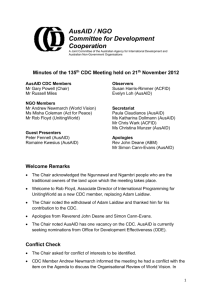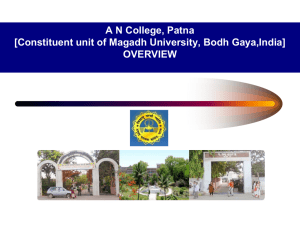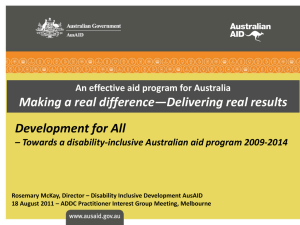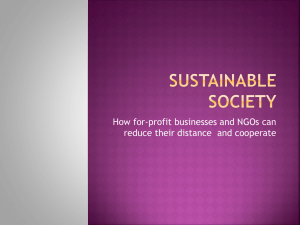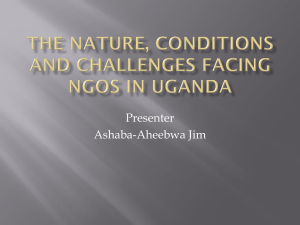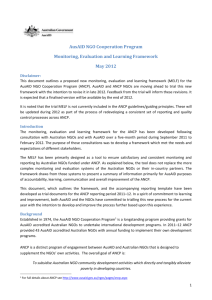Minutes of the 139 th Committee for Development Cooperation (CDC)
advertisement
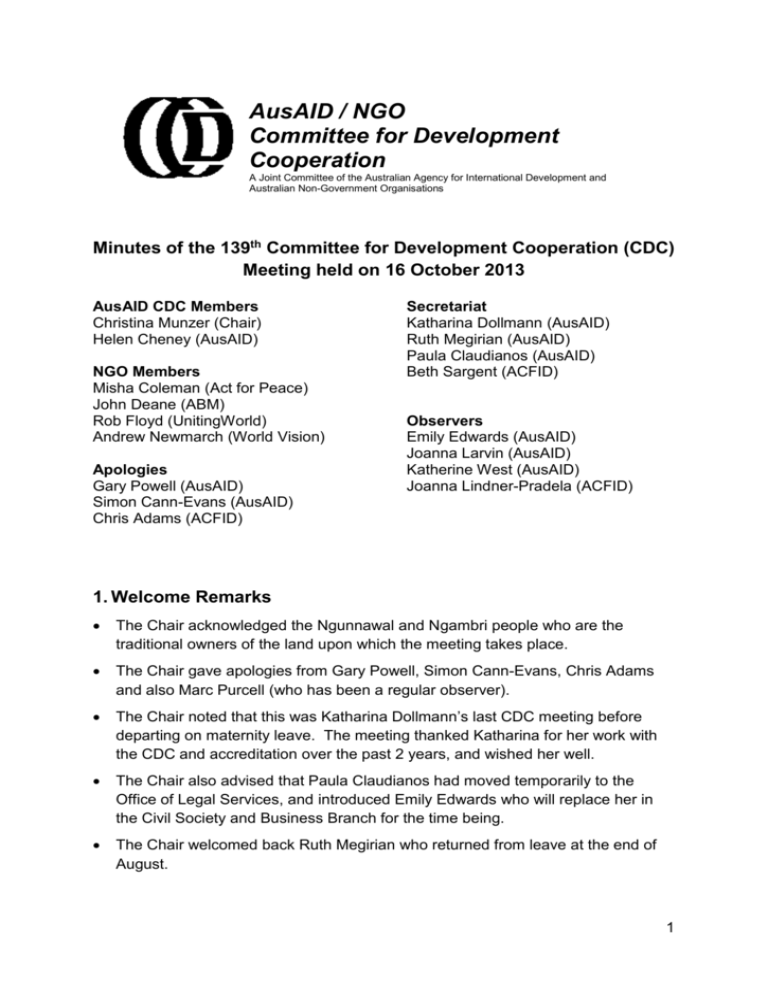
AusAID / NGO Committee for Development Cooperation A Joint Committee of the Australian Agency for International Development and Australian Non-Government Organisations Minutes of the 139th Committee for Development Cooperation (CDC) Meeting held on 16 October 2013 AusAID CDC Members Christina Munzer (Chair) Helen Cheney (AusAID) NGO Members Misha Coleman (Act for Peace) John Deane (ABM) Rob Floyd (UnitingWorld) Andrew Newmarch (World Vision) Apologies Gary Powell (AusAID) Simon Cann-Evans (AusAID) Chris Adams (ACFID) Secretariat Katharina Dollmann (AusAID) Ruth Megirian (AusAID) Paula Claudianos (AusAID) Beth Sargent (ACFID) Observers Emily Edwards (AusAID) Joanna Larvin (AusAID) Katherine West (AusAID) Joanna Lindner-Pradela (ACFID) 1. Welcome Remarks The Chair acknowledged the Ngunnawal and Ngambri people who are the traditional owners of the land upon which the meeting takes place. The Chair gave apologies from Gary Powell, Simon Cann-Evans, Chris Adams and also Marc Purcell (who has been a regular observer). The Chair noted that this was Katharina Dollmann’s last CDC meeting before departing on maternity leave. The meeting thanked Katharina for her work with the CDC and accreditation over the past 2 years, and wished her well. The Chair also advised that Paula Claudianos had moved temporarily to the Office of Legal Services, and introduced Emily Edwards who will replace her in the Civil Society and Business Branch for the time being. The Chair welcomed back Ruth Megirian who returned from leave at the end of August. 1 2. Introduction to the Meeting The Chair noted that since the last CDC meeting in July, there have been a number of significant changes that have impacted on Australia’s aid program, including the ANCP. Change in Government and Integration with DFAT On 18 September the Australian Government announced its intention to integrate AusAID and DFAT. The Administrative Arrangements Order (AAO) issued on 18 September outlined that matters of International Development and Aid would be dealt with by the Department of Foreign Affairs and Trade; previous orders relating to AusAID were revoked. The AAO means that AusAID will cease to be an Executive Agency and will no longer have a direct reporting line to the Minister for Foreign Affairs. This is expected to take effect on or around 31 October. The business of delivering the aid program will continue from 1 November as part of the Department of Foreign Affairs and Trade. We will be working towards a new structure for the Department by 1 July 2014, with transitional arrangements applying from 1 November. The Minister for Foreign Affairs, Julie Bishop, has indicated that the integration will strategically align foreign, trade and development objectives to serve Australia's interests. She has also indicated that aid efforts will focus on the Asia, Pacific and Indian Ocean regions. PNG will remain a priority as will Indonesia. She is supported by the Parliamentary Secretary for Foreign Affairs, Brett Mason. A taskforce has been established to work through the integration process on a wide range of organisational, operational and corporate/staffing issues and is expected to operate until 30 June 2014. The Taskforce reports to a joint DFAT-AusAID Steering Committee chaired by Peter Varghese, Secretary of DFAT and Ewen McDonald, A/g Director General. No decisions have been made yet as to the operating model of the integrated department. The Steering Committee has approved a set of principles that will guide the integration process. The Taskforce is an internal body made up of AusAID and DFAT representatives. o 13 working groups have now been established, comprising AusAID and DFAT staff to make recommendations to the Taskforce on implementation of a range of corporate, operational, policy and program issues. 2 Aid Budget The Government is currently considering its strategic, budget and funding priorities, including for its foreign aid program which remains around $5 billion a year. Information on the funding priorities of Australia's aid program will be provided by the Government in due course. The Department will work closely with partners with a strong track record for effective aid delivery. The Coalition's Federal Election policy commitments released on 5 September 2013 stated that "the Coalition will re-prioritise foreign aid allocations towards Non-Government Organisations that deliver on-the-ground support for those most in need". o This has been reflected in the DFAT-AusAID Integration Principles, the third of which is that "the Department will work closely with NGOs with a strong track record for effective aid delivery." Impact on ANCP operations and planned reforms With a new Government and Minister, AusAID is making no assumptions about what the policy priorities are at this stage other than what has been said publicly, and is therefore moving forward at a more cautious pace, particularly with any new reform activity. We are, however, proceeding with certain administrative reforms to reduce red tape – eg. aligning accreditation to the due diligence framework. CDC members enquired about impact of funding uncertainty on the ANCP. Chair acknowledged NGOs’ concerns and advised that she did not know what impact the Government’s budget decisions would have on the ANCP. ANCP Governance Once further details of the Government’s policy and budget priorities are known, it may be necessary to review the Terms of Reference and membership of this committee, including secretariat functions. ANCP accreditation Work has begun on drafting revised accreditation criteria to align with the Due Diligence Framework and to streamline the accreditation process. It is proposed that the ANCP accreditation assessment could consist of two components: Part A: assessment against the Due Diligence criteria with both a due diligence risk rating as well as a recommendation against ANCP standards (pass/fail). 3 o Only section A of the assessment reports would be available for review on the AusAID-wide Due Diligence report register. Part B: assessment of ANCP specific criteria which will be a pass/fail assessment. Work has commenced to enable accreditation application and assessment to be undertaken using SmartyGrants. This means ANCP On-line will be used to streamline the application process for NGOs, improve data accessibility and create efficiencies. Following the Reviewers Workshop (14-15 October 2013), AusAID will do further work on alignment documentation and preparation for transitioning to an on-line application process. The sector will be provided updates accordingly. Action item: CDC to be updated out of session on accreditation on-line templates. ANCP Meta-Evaluation From an ANCP operations perspective, work has progressed on the meta-evaluation - an independent review of nine project and program evaluations of NGO projects in Cambodia from 2007-2012 on the topic of ‘promoting opportunities for all’ by NGOs under the ANCP. The report which is currently being finalised, provides eight recommendations to NGOs and three specific to AusAID. Broadly, for NGOs, these include advice on improving evaluation standards and practices, ensuring adequate inputs of evaluation expertise, having more explicit consideration of efficiency and supporting evaluation capacities. A teleconference with ANCP NGOs to discuss findings of the report is scheduled for later this week, which will provide an opportunity to agree on the focus of proposed learning events later in the year to help progress recommendations of the report. Report findings are also expected to be presented at Uni-Linkages later in November. CDC NGO members thanked AusAID for the update and noted that there will be a period of uncertainty as changes in Government policy and the integration with DFAT are implemented. They indicated their appreciation for AusAID’s efforts to ensure that transition arrangements will be smooth for the NGO sector and ANCP. 3. Conflict Check The Chair asked to be notified of any conflicts of interest. Helen Cheney advised that she had participated in preparing the Agency Profile for Save the Children whose Organisation Review (OR) report and 4 recommendation for re-accreditation was to be discussed. The Chair agreed that it was appropriate for her to leave the meeting when Save the Children OR was discussed. 4. Endorsement of Previous Minutes The Chair asked members whether they had any issues with the minutes of the 138th CDC meeting. CDC NGO members congratulated AusAID on the shorter turnaround time for the minutes. They also commented positively on the implementation of ANCP Online, including the help-line. The Chair confirmed that the Minutes were accepted. 5. Update on outstanding action items (from Actions Log) Wording of ANCP objective (Ruth Megirian) The Chair introduced Ruth Megirian to speak to this item. Ms Megirian presented the following wording for ANCP objective and description, noting that it was discussed at CDC138 and further input provided to from ACFID and CDC members to AusAID out-of-session. ANCP Objective To support accredited Australian NGOs to implement their own programs and strategic directions consistent with the Australian aid program’s objectives of poverty alleviation and sustainable development. Description of the ANCP The ANCP is a unique flexible AusAID funding mechanism that supports accredited Australian non-government organisations (NGOs) to implement effective development programs that directly and tangibly reduce poverty in developing countries and therefore achieve results for the overall aim of Australia’s aid program. To be eligible, agencies are required to undergo a rigorous assessment of their organisational structure, policies and systems. Accreditation aims to provide AusAID and the Australian public with confidence that the Australian Government is funding professional, well managed community-based organisations, capable of delivering and reporting on development outcomes. The ANCP funding is determined by accreditation status and recognition of Australian community support to NGOs (known as recognised development expenditure). In recognition of the community support for ANGOs and the unique strengths that NGOs bring to development activities, the ANCP supports NGOs’ own programs and projects. 5 The above wording was agreed, noting that the content may change to be in line with Government priorities and the name of the program may change as AusAID is integrated into DFAT. No further action is required at this time. Recognised Development Expenditure (Ruth Megirian) The Chair introduced Ruth Megirian to talk to this item. Ms Megirian updated the CDC on the engagement of a consultant, Geoff Simkiss, to undertake an examination of RDE. The examination will include analysis of the existing model of measuring Australians’ contributions to Australian NGOs that deliver overseas aid programs. The objective is to develop an up-to-date model of measurement of contributions and to simplify the rules used to calculate RDE. It is proposed that the consultant will consult with ANCP NGOs during the course of the examination. NGO representatives noted that minimum RDE levels for base and full accreditation could be increased, and requested that this be considered. NGO representatives also queried whether the examination would look at the 50% cap on the contribution to RDE coming from volunteers, gifts and in-kind contributions, and issues relating to microfinance. This will be passed to the consultant. It was also suggested that training be provided to NGOs to foster increased understanding of RDE – particularly if changes are introduced. The Chair confirmed that it will carefully consider the phase-in of any new systems in consideration of timing for NGOs’ submission of RDE worksheets. Action item: AusAID agreed to consider CDC NGO reps’ request to see the final report out of session and on a confidential basis prior to any decisions being made and that at least 2 weeks be provided for consultation. Global Programming (Ruth Megirian) The Chair introduced Ruth Megirian to present the proposed definition: Global Programming - Definition Australian organisations may be part of an international grouping of organisations that share a common philosophy and name and may implement programs and activities collectively. Such global programs may be implemented through a shared management arrangement with or through its international partners, affiliates, federation and alliances. The accredited Australian organisation must be able to demonstrate an understanding of, and influence over, any global programs to which it provides funds and other resources. Where organisations are determined to be engaging in global programming, they must be able to demonstrate ALL of the following: 6 a. the capacity to manage, monitor, and influence decisions of the group and must provide evidence of engagement in governance processes of global partners; and b. evidence of systems and processes that ensure their participation in group decisions affecting global programs; and c. that it has the right to withdraw funding where necessary; and d. evidence of conducting due diligence on partners within the group to ensure policy compliance, assessment of value for money within the group and effectiveness. NGO representatives noted that reviewers had requested indicators and verifiers for ‘global programming’ and that these are contained in the above definition. The above definition was agreed. Action item: AusAID to update the Accreditation Guidance Manual before December 2013. Technical Assistance (Ruth Megirian) The Chair introduced Ruth Megirian to discuss the conditions under which AusAID would provide technical assistance to NGOs. The meeting agreed that the following should apply: Technical Assistance will be provided at the discretion of AusAID where: (a) A non-accredited Agency is seeking accreditation; or (b) A base accredited agency with an RDE of equal to or less than $150,000 and equal to or less than 5 full time equivalent staff and is within 12 months of its due date for reaccreditation. In order to receive technical assistance organisations must be able to: meet eligibility criteria for accreditation as outlined in the Accreditation Manual; and have made substantial progress on completing their Agency Profile. CSO Due Diligence and Effectiveness Assessment Methodology (Katharina Dollmann) The Chair introduced Katharina Dollmann to provide an update to the CDC. Ms Dollmann advised that: CSBB is in the process of finalising a companion document for Baseline Due Diligence Guidance. 7 The companion document will provide additional guidance that AusAID staff may consider in order to assign a risk rating when conducting a Baseline Due Diligence Assessment on a Civil Society Organisation. The Effectiveness Assessment Methodology will be used as the basis for updating the grants guidelines for the aid program and will be updated to include new effectiveness criteria for NGOs, with the guidelines expected to be completed by November 2013. The new criteria will be piloted in late 2013 with selected country programs. It is expected that the new criteria will be applied to all new grants to NGOs from July 2014. The principles of practice from the Effectiveness Assessment Methodology have been incorporated into the new draft accreditation criteria. Development Awareness Raising (Joanna Larvin) The Chair introduced Joanna Larvin to speak to the Development Awareness Raising (DAR) statistics provided in Paper C. CDC members thanked AusAID for preparing these statistics noting that their intention was to see them in 12 months. Ms Larvin noted that since NGOs enter data directly into ANCP on-line it is now much easier to produce statistics quickly. The meeting agreed that having the data now provided baseline data for comparison with data at the same time next year. NGO representatives noted the decline in DAR expenditure from 2012-13 to 201314, particularly among faith-based organisations, and linked it to the stringency of requirements to not promote a particular religious adherence in DAR. Some organisations, including those represented on the CDC, had reduced or eliminated DAR expenditure in order to be sure of satisfying the guidelines. The Chair responded that the Guidelines were intended to both help NGOs with their project development and to enable AusAID to respond to queries from Parliament and the public about the application of taxpayer funds for development awareness raising. NGO representatives suggested that the issue be revisited in 12 months’ time when additional data becomes available on the impact of the DAR Guidelines on DAR programming. NGO representatives also suggested that ACFID could facilitate discussion on the issue at a Member Information Forum in 2014. Action item: DAR statistics update to be provided in 12 months’ time (October 2014) 8 Template for Extension (Ruth Megirian) The Chair introduced Ruth Megirian to provide further information on developing a template for NGOs to use if they wish to request more time to submit their Agency Profile. Ms Megirian noted that NGOs are advised 12 months before their reaccreditation is due, and that they will be required to submit an agency profile in the following 12 months. She also noted that NGOs are requested to advise AusAID of when they expect to provide their agency profile, and that this should be no more than 6 months from the date on which the agency profile is due. CDC members asked that the proposed paragraph or advice include that late submission of Agency Profiles could risk an organisation being re-accredited and could affect their receiving an ANCP grant in the following financial year. Action item: AusAID to update the paragraph or prepare a template for inclusion in the Accreditation Guidance Manual including the possible consequences for late submission of the Agency Profile and update provided at CDC 140. 6. Update on Policy Refreshers (Joanna Larvin) The Chair introduced Joanna Larvin to provide an update on the policy refreshers . AusAID has started discussions with ACFID on coordinating two initial policy refreshers: child protection and fraud control. ACFID has agreed to ask all NGOs to register for webinar sessions (to be coordinated by ACFID), and to indicate any areas of concern or questions on the two topics to inform the content of these sessions. o A webinar session is tentatively scheduled for 13 December. o CDC NGO members asked that questions be de-identified to enable NGOs to ask questions ‘anonymously’. o Ms Larvin assured CDC members that ACFID’s and AusAID’s intention is to make the webinar available on ACFID’s website for NGOs’ future reference. Additional sessions on other topics may be planned depending on the success of the first sessions. These may include topics such as Work Health and Safety and Anti-terrorism. CDC NGOs asked if AusAID would arrange webinars on some ANCP-specific issues, such as welfare and sustainability. CDC NGO members also advised AusAID that ACFID’s ExCom were currently reviewing their policy position on welfare. 9 7. Other Business Reviewers’ Workshop Ruth Megirian provided a brief overview of the key points covered under each topic in the Reviewers’ Workshop concerning accreditation. Accreditation Reforms – key points There was general agreement that the concept of streamlining is sound. Due diligence perspectives (risk ratings) and ANCP perspectives (program-specific standards) require further refinement as to how criteria would be assessed and reported against. There was also discussion of how reviewers might work using an on-line system. ANCP NGOs’ contractual obligations Spot checks are valuable between accreditations because AusAID can request information on specific programs or activities. In accreditation, NGOs select the programs or activities for the purpose of accreditation. Noted that AusAID’s child protection policy sets minimum standards, and in high risk environments and/or high risk activities, organisations are expected to be able to demonstrate more comprehensive processes to ensure protection for children. CDC NGO members’ feedback to Reviewers CDC NGO members commended Reviewers on improved reporting, particularly that reviewers are citing the evidence that support the statements they make in each report. CDC NGO members asked that CDC members receive an invitation to participate in the full Reviewers’ Workshop as has been done in previous years. It was acknowledged that as it is not always possible to participate in a full day’s workshop, a dedicated session for CDC members to provide feedback is still helpful. CDC NGO members requested the opportunity to observe accreditation reviews. The reviewers suggested that NGO representatives could contact NGOs directly to request to attend. It was noted that there were potential sensitivities associated with having CDC NGO representatives attend organisation reviews which are already challenging for NGOs. Anti-terrorism Guidance ACFID requested an update on progress. The Chair noted that no further progress has been made on updating the Guidelines since AusAID received feedback from the sector. Part of the problem is that the anti-terrorism guidance does not have a dedicated policy home in AusAID. The Chair assured the CDC that AusAID will provide advance notice of the updated Guidelines before they are disseminated more broadly to the sector. 10 Action item: Update to be provided at CDC 140. Value for Money Working Group and progress on VfM definition The Chair provided an update: The definition will be principles based, similar to what we’ve consulted with the NGO sector on through the Effectiveness Assessment Methodology consultation draft. It is likely to include principles relating to, for example, cost consciousness, evidencebased decision making, flexibility and innovation. The principles will cover all partners (similar to the due diligence framework) and not just CSOs. NGO representatives asked that, until a clear definition can be provided, AusAID should not include a requirement for “value for money” in its application and reporting requirements. The Chair explained that the revised Aid Manual to be finalised shortly will help to provide consistency of approach across the Agency, including definitions. Fraud (incidents reported by ANCP agencies and their total dollar amount) AusAID advised that there are currently 18 ongoing fraud cases. Of these, 5 were identified and reported this FY. The oldest case still open is from June 2012. Five additional cases have been closed since January. The total value of fraud cases is between $55,000 and $60,000. It is not possible to be more definitive, as some NGOs have not reported the full value (investigations are still ongoing) and some cases are reported in local currencies which are affected by currency fluctuations. Requirements for work health and safety under ANCP AusAID advised that there is an expectation that Australian NGOs understand their obligations under the 2011 legislation. There is no explicit AusAID or ANCP guidance on this, however, it could become a topic for a webinar. CDC members advised that ACFID could do some background work for its members and coordinate with AusAID. ACFID feedback to AusAID on Child Protection Survey ACFID noted that there was some confusion among NGOs about the extent of AusAID’s request for information regarding child protection systems and processes. ACFID had a meeting earlier this week with AusAID and have sufficient information to go back to their members with further guidance. ACFID has undertaken to send an e-mail to its working group, and AusAID will send the same information to ANCP NGOs. It was noted that ANCP NGOs have been granted an extension to 30 November to submit their survey responses. CDC NGO members requested that AusAID acknowledge the burden to NGOs in its e-mail in making on-going requests for information. The Chair noted that the original e-mail had included this 11 acknowledgement and will ensure that the issue is again acknowledged in the followup e-mail. 8. Next Meeting The CDC agreed that the next meeting will be 5 February 2014. The Chair also agreed that, organisational changes notwithstanding, AusAID will endeavour to send out a schedule of proposed CDC meeting dates for 2014 as soon as possible. 12
